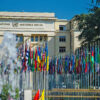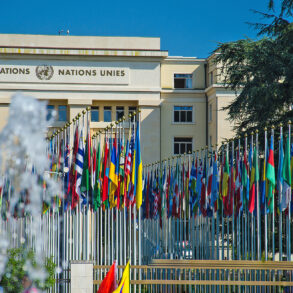Marriage is a crucial life issue that Muslim communities should discuss openly.
Islamic Times – At heart, it is a time-honoured institution: marriage. The design of entering a lasting relationship in accordance with religious conventions has governed the cohabitation of couples for centuries. Today the situation is more complicated, the rising divorce rates cannot be overlooked, people speak of life-stage companionships or do not enter long-term alliances from the outset.
Especially in the 20th century, the phenomenon of sexual relationships was experimented with, and the old social norms were questioned. However, the real distance to the idea of bourgeois marriage emerged a century earlier.
Marriage: Goethe already reflected on it
Goethe, who shocked Weimar society for a long time by having an extramarital affair, already positioned himself with a certain ambivalence on the subject. He observed the dynamics of love lived out freely, the contradictions of convention and the problem of the decay of mores.
And, on a larger scale, the poet foresaw the radical change in society driven by ideas of globalisation and the resulting economic pressures. Goethe suspected that the “velociferous” increase in the speed of all relations in the modern world would change the nature of human relationships.

Photo: Zeno via Picryl.com | Licence: Public Domain
Gustave Flaubert caused a scandal with Madame Bovary
In 1857, two important books were published that looked at the phenomenon of marriage in radically different ways. Gustave Flaubert published his provocative novel Madame Bovary, Adalbert Stifter his education novel Nachsommer.
While Stifter defended the family, marriage and conventions as the most important foundation of a civil society in his work, Flaubert described the disintegration of society and created one of the most important female figures of modernity.
His book caused a scandal and earned the writer a charge of indecency. The prosecution accused him of glorifying adultery, while Flaubert’s defence pointed to the tragic end of his heroine: she commits suicide. The court followed the arguments of the defence and acquitted the writer.
The fate of his novel character Emma, determined by an unfulfilled marriage to the doctor Charles, occupied the entire country. Emma, who comes from a peasant background, spends her marriage with her husband in two small villages in the Rouen area. The relationship is characterised by mutual speechlessness and Emma’s desire for the big world, for luxury, freedom and entertainment.
The writer Gerald Brenan’s definition that in a happy marriage the man provides the landscape, the woman the climate, shows in reverse the whole unhappiness of the relationship. He has taken his wife to the provinces; there alone she receives the spirit of nihilism: boredom.
A visit by the couple, to a festive event at the castle of wealthy nobles, solidifies their discontent. “Through their contact with wealth, something had settled over their hearts that would not go away,” comments the novel’s narrator.
Her efforts to gain something from the dreary married life fail, she finally asks herself, “My God, why did I get married?” It is based on this emptiness that the drama unfolds. “But while familiarity grew closer in their life together, there was an inner detachment that separated her from him,” one reads of the wife’s doubts.
Emma discovers an elective affinity in the young notary Leon, they share certain interests, passions, but a relationship remains unthinkable for both at first. After Leon leaves the village, the provincial beau Rodolphe turns to Emma without seeking a deeper relationship, only interested in an amorous adventure. The ensuing affair ends in the lover’s flight, his beloved having hoped in vain to start a new life with the rich nobleman in the big world.
The failure of the relationship ends in the young woman’s nervous breakdown. Her soul landscape is increasingly torn between conflicting demands and contradictions. On the one hand, she wants to become a saint, repenting the betrayal of her husband; on the other hand, she continues to strive for freedom, for adventures and an eventful life.
She deludes herself, dreams, gets increasingly into debt to buy things, and finally begins an affair with Leon, whom she meets again by chance in Rouen, an affair marked by emotions but without happiness in the long run.
It becomes increasingly difficult for her to conceal her escapades from her husband. Under economic pressure, Charles is threatened with foreclosure because of her financial transactions, and her situation becomes increasingly desperate. She finally commits suicide. Her husband later learns of the extent of the whole fraud and dies of a broken heart.

Photo: Prostock-studio, Adobe Stock
Relevant to this day
The novel attracts a great deal of attention in 19th century France. Many women from all over the country write to the writer expressing their sympathy or understanding about the tragic events. Flaubert slowly realises that he has created a figure in which many women are mirrored or reminded of their own living conditions.
The book does not lose its relevance today. To this day, Flaubert’s work has triggered a debate about the meaning and significance of marriage. The question of whether the tragic end of the couple could have been prevented has been discussed again and again.
The selection of possible answers that the psychologist Flaubert indirectly offers his readership could contribute to a timeless marriage guide. The couple should have settled in a place that suited the needs of both protagonists. They should have been open about their respective desires. The young wife lacks genuine spirituality, is lonely and has no caregivers.
Her husband is incapable of recognising his partner’s suffering, reading signs in this regard and responding to them early on. In general, none of the typical men who encounter Emma can recognise her complex figure, let alone harmonise her inner life.
However, Flaubert also refers to another phenomenon that affects both sexes (Flaubert: “I am Madame Bovary”) equally. A marriage that is based only on conventions and not on love is compensated for with other pleasures, for example the desire for material wealth, power or affairs. A compensation, however, that is fundamentally incapable of creating fulfilment.

Photo: Pikoso.kz, Shutterstock
Spirituality or the prerequisites for happiness
In this sense, a happy marriage is based, among other things, on supporting and not hindering the desire for spirituality, economic freedom or the search for meaning of those involved. This endeavour may be easier if the spouses are clear about their goals, have a common religion or philosophy.
The study of 19th century literature on the subject, be it Tolstoy’s Anna Karenina, Fontane’s Effie Briest or Flaubert’s Madame Bovary is certainly a key to countering the growing number of divorces in Muslim societies in terms of content.
Obviously, pointing the finger at Islamic law and the corresponding conventions does not really solve the problem. The lesson to be learned from the figures mentioned is not to downplay the social impact of adultery or divorce, but rather to reinvent the meaning and significance of marriages and family formation.
The prerequisites for a happy marriage under the conditions of the 21st century must be included in these considerations. In doing so, one will have to study and understand the current economic, social and psychological conditions of young and older couples.
This approach does not exclude drawing on the extensive knowledge of Islamic teachings. In the 1970s, a Moroccan scholar was asked by a young man professing Islam how an Islamic marriage could be happy, when experience in other cultural areas showed that conventional marriage was the “grave of love.”
The wise man smiled at the question and wondered why knowledge about the happiness of marriage was increasingly lost. “Don’t you know the solution? Many guests!” was the man’s simple answer. Basically, the underlying wisdom can also be applied to the story of Madame Bovary. Marriage – at least from an Islamic perspective – is not only about the “I” and the “you,” but also about the “us.”
Relating to a living and vibrant community is at least one solution to combat the loneliness and emptiness that many couples find themselves in one day. It is in the nature of the question of the recipe for a fulfilling marriage that it cannot be answered in a universal way. The stories of marriages are as diverse as the biographies of the people who marry.
But the Muslim community should discuss this crucial life issue openly, drawing from all accessible sources and drawing on the experiences of Muslim couples, were they successful or not.
* This article was first in its German version here: https://islamische-zeitung.de/themen-special-ehe-familie-die-ehe-im-21-jahrhundert-eine-institution-unter-druck/











